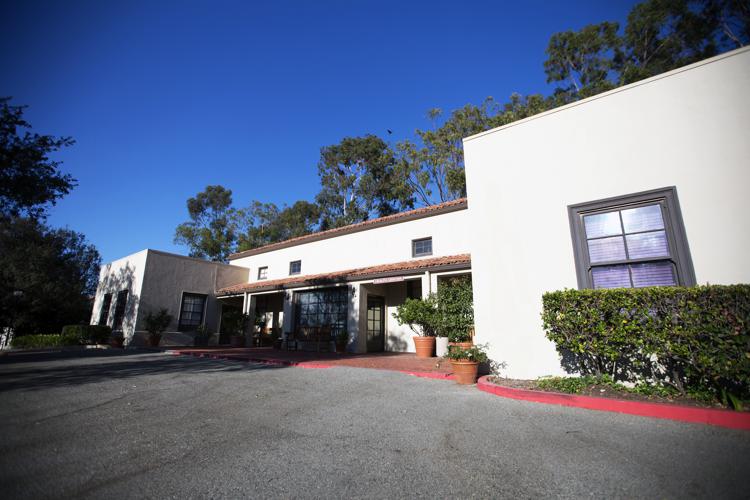A man sat in a plastic chair holding an invisible daiquiri and dramatically repeating, “I laugh too much.” The man sipping an invisible Bombay gin beside him answered with only the phrase, “I can’t save you.” A conversation of those few words played out between the two with rapidly evolving emotions.
This scene took place as part of the Emmons Psychodrama Process Group Oct. 7 in the Keck Theater rehearsal room. The first open meeting of this pilot program drew nine members of the campus community to learn about and participate in psychodrama — integrating group therapy, theatrical improvisation and techniques such as self-representation, mirroring, doubling, soliloquy and role playing and reversal. While the first meeting was open to the campus community, eventually these sessions will evolve into closed groups of up to 12 people with reservations, to foster private and comfortable environments for group therapy. Emmons Wellness Center staff therapist William James Jones will lead the group from 3–5 p.m. every Friday in Keck Theater.
“The goal of the Psychodrama Process Group will be to investigate, express and gain insight into one’s life, culture and sense of identity,” Jones said via email.
Emmons Wellness Center Senior Director Sara Semal is excited that Emmons is offering such a diversity of groups this semester that address different needs and populations.
“I hope everyone has something they can access, between individual counseling, therapy groups and support groups,” Semal said via email.
As a new member of the Emmons staff, Jones introduced the opportunity to Occidental this semester by drawing from his experience in group counseling and teaching theatrical improvisation. A Chicago native, Jones graduated from the Chicago Academy for the Arts as a theater major and acted in theater and television such as the series “California Dreams” and “USA High.” Jones is currently pursuing a doctorate from Pacifica Graduate Institute after shifting his career to counseling and psychology. He is also a member of the Psychologists for Social Justice Chapter at Pacifica and recently won the 2016–2017 Multicultural Scholar Award from the American Psychological Association.
Developed by prominent social scientist Jacob L. Moreno in the early 1900s, psychodrama therapy is conducted on a stage or a proxy stage and includes elements of theater to reenact real-life situations or inner mental processes. This creative approach to psychotherapy allows participants to explore and solve personal problems by evaluating behavior and reflecting on past incidents.
Jones began the session with various introduction techniques, which included a drumming circle, a call and response and improvisational physical expression exercise. Jones created a playful environment that warmed up the group in an effort to comfortably address more difficult emotions like resentment and self-loathing. The participants giggled self-consciously throughout the session and hesitated when Jones called for volunteers for exercises, but genuinely entertained their peers once they built up the courage to take the stage and surprised themselves upon self-reflection.
Jones challenged participants to act out scenes such as ordering at Starbucks using just one word and improvising a ShamWow and tampon commercial in pure gibberish. The exercises proved to be frustrating and awkward at times when the actors found themselves struggling to express their thoughts with such limitations. Near the end of the two-hour session, participants wore more concerned or straight-faced expressions, as Jones encouraged individual participants to express themselves in front of the group, acting as if they were talking to a person significant to them that they had not seen for a long time. Once Jones wrapped up the exercises, the mood of the room lightened significantly as participants reflected on the experience.
Tal Medovoy (senior) and Julieta Alas (sophomore) participated in the psychodrama group and described their first impressions.
“I have done drama class and stuff like that in high school, but I’ve always felt very out of place,” Alas said. “It was really nerve-racking and I still feel really self-conscious.”
Medovoy said that psychodrama challenged him in the way he expected.
“It challenged me to get out of my comfort zone, express myself in ways I typically don’t and use my imagination in a new way,” Medovoy said.
Despite her apprehension towards psychodrama, Alas was glad she tried it.
“Even though it was really hard for me to participate, it was cool seeing other people I could tell were pushing themselves too,” Alas said. “It was dope.”
According to Medovoy, the experience helped participants get a lot of emotion off their chests and feel proud of their courage on stage.
“It was inspiring to see the people around me gradually overcome their nerves and self-conscientiousness and open up to the group and themselves,” Medovoy said.
“What’s there to lose?” Alas said. “YOLO. Maybe it will help me out.”
Medovoy encourages others to participate as well. He realized that challenging oneself in this unique way and experimenting with new forms of self-expression can yield unexpected benefits.
“Unfortunately, I feel like this program has the potential to be most helpful to those who are unlikely to attend,” Medovoy said. “I encourage students who instinctually reject the idea and would normally not participate in this kind of activity to consider attending.”
Have a tip? Email us at weekly@oxy.edu or tweet us @OxyWeekly.
![]()



































